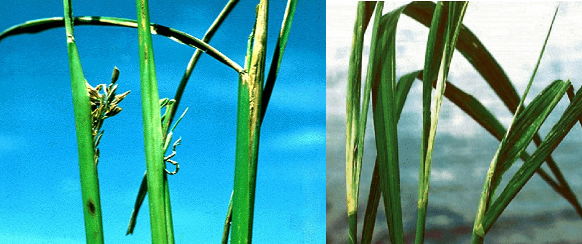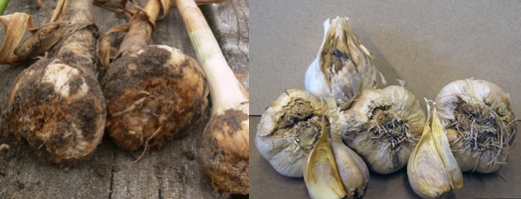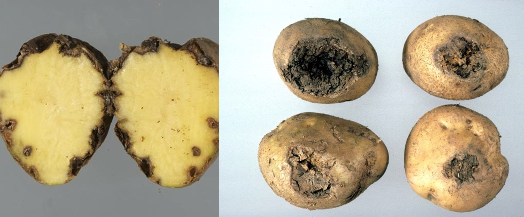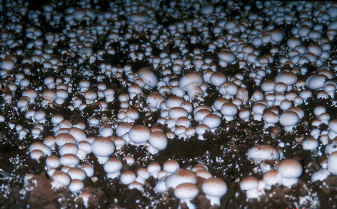🪱 Ditylenchus Nematodes
Species, Biology, Symptoms, Integrated Management
Which of the following is not wrong regarding Ditylenchus nematodes?
Rice Stem Nematode
- Butler first reported
Ditylenchus angustusin 1913 form East Bengal region (Now Bangladesh) as the casual organism of Ufra disease of rice. - Butler named this disease in the honour of his assistant Uftar Rahman, who first brought the diseased specimens to him.
- In India, the rice stem nematode is prevalent in the eastern states of Assam, West Bengal, Bihar and parts of Uttar Pradesh.
- Rice is the main host.
- It is an ectoparasite of above plant-parts.
- The pre-adult stage (fourth stage juveniles J4) forms cottony masses (nema wool) as the nematodes enter quiescent phase when the crop matures.
- Infestation mainly in deep water paddy.
Symptoms
- The first symptoms appear when the crops is 2-3 months old in the form of chlorosis and yellow streaks on the upper leaves.
- The symptoms of Ufra are well noticed in two months old crops.
- Later two types of symptoms are manifested:
- Swollen Ufra in which case the panicles fail to emerge, and the stalks show a tendency to branch.
- Ripe Ufra when panicles emerge but are distorted and sterile.
- Twisting of leaf & leaf sheath.

Stem and bulb nematode
- Ditylenchus dipsaci is a serious problem of
bulbousornamental plants and other crops like onion, garlic, alfalfa, celery, oats, rye etc. in temperate areas of the world. - Stem and bulb nematode undergoes quiescence and forms nema wool in which condition it can survive for as many as 23 years.
- By infestation of this nematode onion suffers heavy losses as it causes “onion bloat” disease.

Potato rot nematode
- Ditylenchus destructor
- It is prevalent in temperate region of Europe & North America
- Cause root rots on potato tubers.

Mushroom Nematode
- Ditylenchus myceliophagus
- Mycophagous nematode feed on fungal mycelium.
- This nematode was first reported that to cause damage on mushroom.
- It is also found in India.
- It is found with Aphelenchoides composticola.

References
- Dropkin, V.H. 1980. Introduction to plant nematology. John Wiley and sons, INC. New York.
- Singh, R.S and Sitaramaiah, K. 1994. Plant pathogens. The plant parasitic nematodes. Oxford & IBH Pub. Co. Pvt. Ltd. New Delhi.
- Parvata Reddy, P. 1983. Plant nematology. Agricole Pub. Co., New Delhi.
- Southey, J. F. Laboratory methods for work with plant and soil nematodes Tech.
- Bull. Min. Agric. Fish. Food. Her Majesty’s Stationary Office, London.
- Walia, R. K and Bajaj, H. K (2014). Textbook of Introductory Plant Nematology. Directorate of Knowledge Management in Agriculture, ICAR, New Delhi.
- Kumar, V., Khan, M.R. & Walia, R.K. Crop Loss Estimations due to Plant-Parasitic Nematodes in Major Crops in India. Natl. Acad. Sci. Lett. 43, 409–412 (2020). https://doi.org/10.1007/s40009-020-00895-2
Which of the following is not wrong regarding Ditylenchus nematodes?
Rice Stem Nematode
- Butler first reported
Ditylenchus angustusin 1913 form East Bengal region (Now Bangladesh) as the casual organism of Ufra disease of rice. - Butler named this disease in the honour of his assistant Uftar Rahman, who first brought the diseased specimens to him.
- In India, the rice stem nematode is prevalent in the eastern states of Assam, West Bengal, Bihar and parts of Uttar Pradesh.
- Rice is the main host.
- It is an ectoparasite of above plant-parts.
- The pre-adult stage (fourth stage juveniles J4) forms cottony masses (nema wool) as the nematodes enter quiescent phase when the crop matures.
- Infestation mainly in deep water paddy.
Symptoms
- The first symptoms appear when the crops is 2-3 months old in …
Become Successful With AgriDots
Learn the essential skills for getting a seat in the Exam with
🦄 You are a pro member!
Only use this page if purchasing a gift or enterprise account
Plan
Rs
- Unlimited access to PRO courses
- Quizzes with hand-picked meme prizes
- Invite to private Discord chat
- Free Sticker emailed
Lifetime
Rs
1,499
once
- All PRO-tier benefits
- Single payment, lifetime access
- 4,200 bonus xp points
- Next Level
T-shirt shipped worldwide

Yo! You just found a 20% discount using 👉 EASTEREGG

High-quality fitted cotton shirt produced by Next Level Apparel